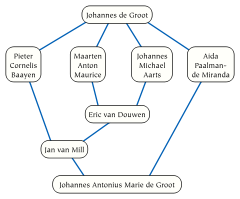Academic genealogy
An academic, or scientific genealogy organizes a family tree of scientists and scholars according to mentoring relationships, often in the form of dissertation supervision relationships, and not according to genetic relationships as in conventional genealogy. Since the term academic genealogy has now developed this specific meaning, its additional use to describe a more academic approach to conventional genealogy would be ambiguous, so the description scholarly genealogy is now generally used in the latter context.

Overview
The academic lineage or academic ancestry of someone is a chain of professors who have served as academic mentors or thesis advisors of each other, ending with the person in question. Many genealogical terms are often recast in terms of academic lineages, so one may speak of academic descendants, children, siblings, etc.
Websites such as the Mathematics Genealogy Project[1][2] or the Chemical Genealogy[3] document academic lineages for specific subject areas, while some other sites, such as Neurotree and Academic Family Tree aim to provide a complete academic genealogy across all fields of academia. However, not all links recorded in such databases are formal advisor-advisee relationships; for instance, the University of Cambridge did not require a formal doctoral thesis until 1919, and academic genealogies that include earlier Cambridge students tend to substitute an equivalent mentor.
Academic genealogies are particularly easy to research in the case of Spain's Doctor degrees, because until 1954 only Complutense University had the power to grant Doctorates. This means that all holders of a Doctor degree in Spain can trace back their academic lineage to a Doctoral supervisor who was a member of Complutense's Faculty.
Academic genealogy may influence research results in areas of active research. Hirshman et al. examined a controversial medical question, the value of maximal surgery for high grade glioma, and demonstrated that a physician's medical academic genealogy can affect his or her findings and approaches to treatment.[4]
References
- Carr, Sarah (August 18, 1999), "Retired Mathematician Develops a Family Tree of the Scholars in His Field", The Chronicle of Higher Education.
- Jackson, Allyn (2007), "A labor of love: the Mathematics Genealogy Project" (PDF), Notices of the American Mathematical Society, 54 (8): 1002–1003.
- Chemical Genealogy Database Homepage
- Hirshman, Brian R (January 4, 2016), "Impact of medical academic genealogy on publication patterns: An analysis of the literature for surgical resection in brain tumor patients", Annals of Neurology, 79 (2): 169–177, doi:10.1002/ana.24569, PMID 26727354
External links
- The Academic Family Tree: A project combining academic genealogies of 38 (as of August 2015) academic disciplines
- Mathematics genealogy search (includes much of computer science and physics)
- Chemical genealogy
- Scientific genealogy master list (two sections: Scientists Associated with Concepts in Chemistry & Physics; Scientists Associated with Discovering the Elements)
- How to trace your scientific genealogy
- Philosophy Family Tree
- Automatic doctoral advisor genealogy diagram using Wikipedia by Nghia Ho